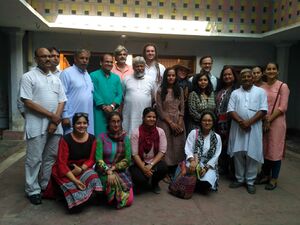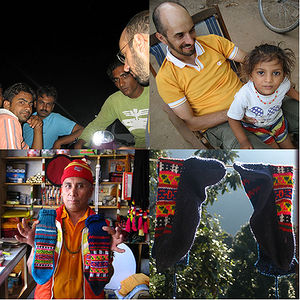
This article is an offshoot of India community action focusing on community resources and assets. Resources such as networks, events and community involvement (people and relationships) can be considered as primary resources. Also resources are the activism and physical assets (or what citizens value), such as green spaces and biodiversity, cycle lanes, food initiatives, etc, from the other India community pages.

Video gallery[edit | edit source]
Visions[edit | edit source]
Decentralising Digital, Working with rural communities in Karnataka, India, Decentralising Digital is an ongoing research project seeking to co-create new narratives for decentralised digital futures. added 12:20, 15 September 2021 (UTC)
- Between India and Dundee, experiments in how to "decentralise digital". Meaning putting powerful tech in communities' hands. Sep 12[1]
Commons[edit | edit source]
This marketplace in India has been self-governed for 400 years[edit | edit source]
Despite car-centric urban development and top-down decision-making, the Begum Bazaar, in Hyderabad, India — a historic wholesale market which has existed for over 400 years — has remained a shared social space hosting a vibrant economy. The use of street space surrounding the market is appropriated by vendors through complex practices of mediation and includes a mix of formal and informal rules. Acquiring a space requires informal negotiation between neighbors, and is not always without conflict. Vendors may inherit or be granted the right to use street space through verbal agreement by other established vendors from the same geographical origin or religion. Generally, compliance with formal rules is low, but it is far from being an ungoverned space. Thus, parking is regularly used by vendors, leaving motorists without space, maximizing its value as a marketplace.
In Begum Bazaar, the regulation of street space is representative of the eight design principles of common pool resource management as outlined by Nobel Prize winning economist Elinor Ostrom in her book "Governing the Commons: The Evolution of Institutions for Collective Action." This is not a straightforward example to be replicated, but rather it showcases what self-organization can bring: a vibrant, diverse, and pedestrian-oriented space in a city where most other scenarios of top-down governance has often led to gentrification and car-centric development.[2]
Other links[edit | edit source]
- Foundation for Ecological Security, pioneering advocate of the commons in India, especially on behalf of the poor.
Community energy[edit | edit source]
Maps[edit | edit source]
India•CR - India Citizen Reports runs on Ushahidi since 2011 to collect and disseminate reports in various categories like civic problems, crimes and corruption. TelecomMap.com uses Ushahidi to map 3G network quality and Wi-Fi hotspots.[3]
Citizens data initiative[edit | edit source]
The India Biodiversity Portal is a repository of information designed to harness and disseminate collective intelligence on the biodiversity of the Indian subcontinent. It is designed to seek voluntary participation of users and establish a participatory platform for content generation, verification and usage. The Portal aims to facilitate and enable widespread participation by all citizens in contributing and accessing information on Indian biodiversity, that benefits science and society, contributes to a sustainable future; and guides the development and use of the Portal.
Citizen Science: Any member of the general public can upload an observation of any species sighted. Other members help identify, annotate and curate the observations. All data on the portal is shared under Creative Commons licenses. "Open and free access to biodiversity information is essential to promote conservation, management and sustainable use of biodiversity and has immense potential to increase the current and future value of the country's biodiversity for a sustainable society."
Past events[edit | edit source]
- April 22 - 27, 2014, Neighbourhood Trees Campaign, India Biodiversity Portal
See also[edit | edit source]
local information and news can be found, or shared, via our many location pages
References
- ↑ thealternative.org.uk
- ↑ Shareable, Oct 22, 2018
- ↑ Wikipedia:Ushahidi#2011


